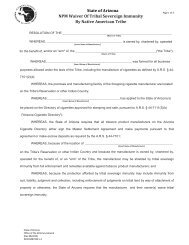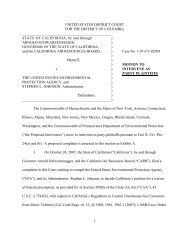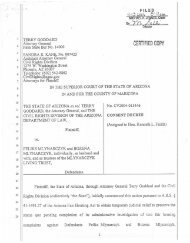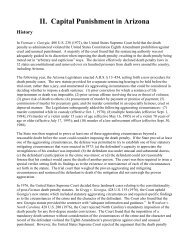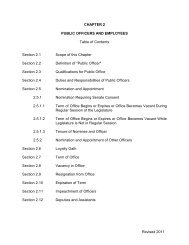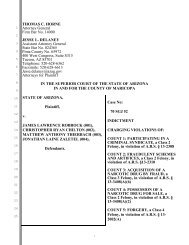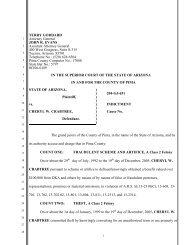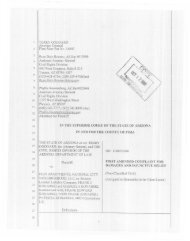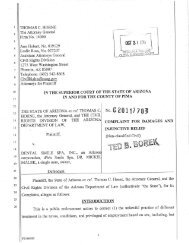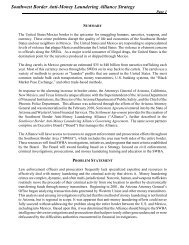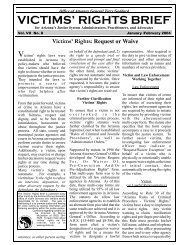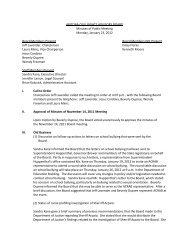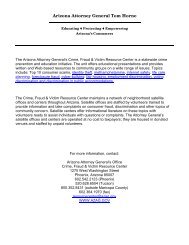Arizona Attorney General Terry Goddard 2010 Annual Report
Arizona Attorney General Terry Goddard 2010 Annual Report
Arizona Attorney General Terry Goddard 2010 Annual Report
You also want an ePaper? Increase the reach of your titles
YUMPU automatically turns print PDFs into web optimized ePapers that Google loves.
Civil Rights Division<br />
Division Summary<br />
Division Highlights<br />
captions and descriptions.<br />
The Civil Rights Division (CRD) enforces the <strong>Arizona</strong> Civil<br />
Historic Ninth Circuit Victory<br />
The Division appealed that deci-<br />
Chief Counsel Melanie Pate<br />
Rights Act, which prohibits discrimination in employment,<br />
voting, public accommodations and housing, by investigating,<br />
mediating and litigating civil rights complaints.<br />
The Division provides conflict resolution services and<br />
mediation programs statewide. It not only responds to<br />
On April 30, <strong>2010</strong> the Ninth Circuit<br />
Court of Appeals reversed the U.S.<br />
District Court’s dismissal of State<br />
v. Harkins Amusement Enterprises,<br />
Inc., a lawsuit in which the State<br />
sion to the Ninth Circuit, which<br />
ruled that closed captions and<br />
descriptions are auxiliary aids<br />
and services included under Title<br />
III of the ADA.<br />
Mission:<br />
To enforce civil rights<br />
laws and eliminate<br />
discrimination statewide<br />
by increasing public<br />
awareness of civil<br />
rights issues. These<br />
goals are reached<br />
through investigation,<br />
enforcement, education<br />
and the provision of<br />
services to victims,<br />
including dispute<br />
resolution services.<br />
The Division continues<br />
to focus on outreach<br />
and education involving<br />
vulnerable populations.<br />
complaints, but seeks to reduce discriminatory conduct<br />
through education and outreach in the community.<br />
CRD is comprised of two sections: Compliance and<br />
Litigation. The Compliance Section screens and investigates<br />
complaints involving civil rights violations and provides<br />
education and outreach to the public.<br />
The Litigation Section is responsible for litigation in state<br />
and federal courts involving civil rights violations and<br />
provides legal resources for drafting legislation, education<br />
and outreach.<br />
The Conflict Resolution Program, a component of the<br />
Litigation Section, provides services statewide, including<br />
mediation, facilitation, conciliation and training. The<br />
mediation programs encompass civil rights, truancy and<br />
victim-offender issues.<br />
sought the installation of equipment<br />
to display captions and audio<br />
descriptions for people with sensory<br />
disabilities. It was a groundbreaking<br />
legal decision because it<br />
marked the first time that a Circuit<br />
Court of Appeals has ruled on<br />
whether the Americans with Disabilities<br />
Act requires captions or<br />
descriptions in movie theaters.<br />
In 2006, the Civil Rights Division<br />
filed a lawsuit against Harkins<br />
Theaters on behalf of <strong>Arizona</strong>ns<br />
with sensory disabilities. The<br />
U.S. District Court dismissed the<br />
suit in 2008, concluding that the<br />
Americans with Disabilities Act<br />
(ADA) and the <strong>Arizona</strong>ns with<br />
Disabilities Act (AzDA) do not<br />
Captioning provides the text of the<br />
soundtrack of a movie for people<br />
who are deaf or hard of hearing.<br />
Audio descriptions provide information<br />
about key visual aspects<br />
of a movie through descriptions of<br />
scenery, facial expressions, costumes,<br />
action, and scene changes<br />
during pauses in dialogue.<br />
The Civil Rights Division received<br />
support from many disability and<br />
civil rights organizations who<br />
filed briefs with the Ninth Circuit,<br />
including the U.S. Department of<br />
Justice, the Screen Actors Guild,<br />
The National Association of the<br />
Deaf, the American Council of the<br />
Blind and the National Disability<br />
Rights Network.<br />
require movie theaters to provide<br />
<strong>Arizona</strong> <strong>Attorney</strong> <strong>General</strong> <strong>Terry</strong> <strong>Goddard</strong> • <strong>2010</strong> <strong>Annual</strong> <strong>Report</strong><br />
44



